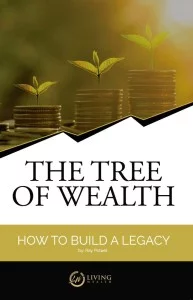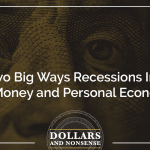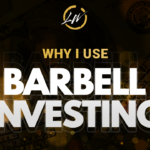[vc_row][vc_column][vc_column_text]In this episode, we will discuss how to end debt. You see, there is a difference between paying off your debt and recapturing your debt. And we’ll explain how this works so you can finally get off the debt hamster wheel.
There are some staggering statistics on the level of debt Americans are carrying. It’s truly frightening.
But it’s vitally important that you change your mindset from merely, I want to get out of debt. This should change to wanting to recapture your debt.
Getting out of debt is a topic speak with clients about every day, and that’s the problem with debt. And whenever you adhere to the concept of becoming your own banker, you start to see ways of making a lot of money by recapturing your debt.
The problem is that a lot of people know what we mean by recapturing debt. And there’s one more step that needs to take place we share in this episode.
How to End Debt and Recapture Your Money Topics:
- How bad is the debt crisis
- What is recapturing debt
- Using a policy as the engine
- The counter-intuitive way investing debt works
- Understanding asset rich and cash poor
- Finding opportunities to teach children about debt
Want Financial Freedom?

Start your journey to financial freedom with this first step.
Get our 122 page eBook The Tree of Wealth here now.
Episode Takeaways:
Podcast transcript for episode 27: End Debt Reclaim Your Money
Nate: In this episode, we will discuss the difference between paying off your debt and recapturing your debt. It’s vitally important that you change your mindset from simply, I want to get out of debt, to, I want to recapture my debt, so that you can finally get off the debt hamster wheel. She’s Holly, and she helps people find financial freedom.
Holly: He’s Nate. He makes sense out of money. This is Dollars and Nonsense. If you follow the herd, you will be slaughtered.
Nate: Okay. Well, this is a topic that Holly and I probably speak with clients about every day, and that’s the problem with debt. Whenever you adhere to the concept that we adhere to, which is becoming your own banker, you really start to see that, if I can make a lot of money by recapturing my debt, I want to do it. The problem is, and this is what we find, is that a lot of people have this desire to be debt free, but they don’t understand what we mean when we say recapture. There’s one more step that needs to take place, and we’re going to discuss that and how you can change your mindset and profit more.
But also, Holly had told me the reason behind this, as well, was that she had went out and heard some statistics on the level of debt that we’re carrying in America, and it really is frightening, actually. So I was thinking we could have Holly mention those and also get into why people find themselves in the debt that they find themselves in.
Holly: I think most importantly is that right now, in 2017, we are in greater financial crisis that we were in 2008, which means we’re carrying even more debt in the US in the households alone. And the actually household US debt currently in the first quarter in 2017 was $12.87 trillion, and that is all of us living on debt. What’s happening is, the reason for this is because of the cost of education, so student loans, credit cards, and car loans. That’s what’s driving this debt up in the US households. And the other things is that, for the first time we have surpassed the credit card debt and it is now over $1 trillion in the US alone is owed to credit cards, and the reason for that is simply that we are a society that has learned to not only buy on credit, but we’re not living within our means. I’m going to give a practical example and then explain why we get to where we’re at.
My daughter wanted to buy a $9 pocket watch when we were out on Saturday, and she only had $4 in her wallet. And she said to me, “But, mom, I have $5 at home.” But, the money wasn’t in the wallet, and I didn’t know if she did have $5 at home, and so instead of letting her buy the pocket watch, she didn’t get to buy it because she couldn’t prove she had the additional $5 and she missed out on the pocket watch. And she said, “Yeah. But I can just give it to you when I get home, and if I don’t have it, I can do some work to earn that money.”
And if the money’s not in the wallet, or it’s not in the bank account, then really, we shouldn’t be purchasing that vehicle, that pocket watch, whatever it may be, hoping that we’re going to earn the money to be able to pay it off. If our monthly expenses are exceeding what our needs are, basically you’re overspending, then you’ve got to cut down on some area. But instead, we’ve been taught to self gratify. That new iPhone comes out, so I don’t have the money in the bank, but I will in a couple weeks, maybe, so let me just buy it now in credit and then I’ll pay it off later. But, what we’re constantly doing is working really hard to buy these assets and everybody else is getting the money. And so really we have to go back to that philosophy of needs and wants. And really, if it’s not a need, then maybe it means you don’t get that new iPhone or you have to wait. I think, Nate, you have an example of a client who wanted to buy a boat.
Nate: Yeah. Delayed gratification is no longer prioritized in society. I was just meeting with a client, as you said. It doesn’t really matter if it’s a boat, or if it’s a car, whatever it is, we do have things that we really want to get, and most of the times, we don’t like to wait to get them. But, I’m telling you, if you would actually wait to purchase it until you had the money, let’s say you were doing the becoming your own banker strategy. That’s what we do and that’s what I was talking to this individual about. One of his friends said, “Hey. How about instead of buying this boat,” borrowing from whoever it was who was giving him the loan, probably just the people selling the boat to actually purchase this. Why don’t you go talk to Nate? And he’ll show you how to use this becoming your own banker strategy using a policy and you could fund that up over the next couple of years and actually pay cash for the boat and take the same cashflow you were going to send to the boat payment people, and send it back to yourself and you’ll actually make a profit. You’ll get all the principle interest and make a profit on it back.
[inaudible 00:05:23]. That sounds great, and if you did that over your lifetime and used a policy to finance things and paid yourself back, really in the grand scheme of things, Holly, you would agree with this, it’s like a couple years. If you would just build the bank up for a couple years, every transaction you make for the rest of your life will be more profitable and more simple, and you won’t have to stress out about it, if you just capitalize a bank for the next couple of years, that would be able to handle the things you actually want to get.
Holly: And the philosophy of putting away money, you can call it savings, but in reality, you really are using your money to actually pay yourself for the work that you’re doing, because typically today, like we’ve said numerous times, everybody else is getting that dollar. You’re a slave to many people, but instead, you need to start paying yourself, and that is through banking and saying, “When and how can we afford it?” Instead of, we are a society that has become instant gratification and if you actually worked towards putting that money into savings and using your bank, that we call through life insurance. To purchase that vehicle, you’re actually bringing that money back to your family and that interest back, instead of giving it away to other people.
And so I think the topic of recapturing is, all of us have made, normally, an extra house payment or we’ve saved up to pay off that credit card debt. And once the credit card debt was paid off, we took the money from our savings, or however we saved it, and we never repaid that money back to ourselves, so we just gave it away freely. And the difference is that through recapturing your money, you’re actually able to bring that money back to you, because you did pay off the debt it was owed, but now you’re going to pay yourself back for that debt.
Nate: Yes. I think we’ll get a word in from our sponsor, and I think after that we’ll just dive right into really what people can do to recapture their debt, so quick word from Living Wealth, our sponsor, and then we’ll get back right into this whole idea of recapturing.
Holly: Are you tired of being stressed about money? The Dollars and Nonsense Podcast is sponsored by Living Wealth. Visit livingwealth.com/freedom to get your free smart money eBook and sign up for our personal wealth presentation today. Living Wealth is a family owned and operated business, which works with individuals, families, and even businesses to slay the money stress dragon. Our clients receive individual coaching regarding wealth creation and how to create a retirement income. You’ll be enabled to have cash today and in the future. Since 1972, Living Wealth has been committed to educating smart people on basic money principles to assist them in becoming debt free and finally find financial freedom. Let us help set you free. Remember to visit livingwealth.com/freedom to receive your free eBook and even sign up for an individual wealth presentation today.
Nate: If you like the work we do here, be sure to tell others what you think. Leave us a review on iTunes. You can go to livingwealth.com/itunes to get to the show quickly.
Holly: Once at iTunes, click on the ratings and review, then click the button that says, “Write a review.” Just a few nice words and a five star review is all we ask.
Nate: Okay. We just left off, Holly had just kind of introduced us to this idea of recapturing. And that’s the thing, really, guys. Most people, if you really want to delve down deep, the reason you want to pay off your debt is because you’re tired of making payments. I’m tired of making payments to the car people. I’m tired of making payments to the credit card people, the student loans, the mortgage. And if I didn’t have to make these payments, I could finally do all the things I wanted to do.
And the problem with that reasoning, I’ve seen it time and time again, is that when you actually focus all your energy on paying off the debt, and you finally have it paid off, and you don’t have the payments anymore, that if you don’t focus on recapturing and what Holly and I mean by recapturing is, start taking that same cashflow that you were paying to those creditors and pay it back to yourself. If you don’t take that same cashflow and start rebuilding your own bank, guess what’s going to happen in the next six months to a year.
Sure. You may not have those payments, but your lifestyle will probably just start to expand. And then, whenever the car breaks down, or you go on vacation, or you spend money on Christmas, or all these things, the reasons why people find themselves in debt, well, guess what. You’re going to have to be back in debt and it’s going to start the cycle over again, where now you’re fed up with payments a couple years later and you go after it again. It literally is like a hamster wheel. You’re not really getting anywhere unless you focus on recapturing. Holly, what are some mindset shifts that people can make that you think, to start getting away from this, oh, I just can’t wait to pay my debt off, to, man, I’m excited. I really want to recapture this and build wealth with a debt focus?
Holly: I think one of the shifts is understanding that whether it be $1500 you owe, or $50,000 you owe, you have to start somewhere. And once that money’s left your hand, if it was owed before to a bank or a creditor, you paid them off in typically monthly payments, then you should do the same for yourself. What you really have to do is start … If it was $200 that you had to pay for the next 15 months, then you should, after you pay that, you’ve saved that money up. You worked hard for that money. Then, you should then keep paying yourself that $200. It really is a shift of understanding that a debt, once it’s paid off, just … You saved up all the money and you gave that money away, and you want to bring that money back to yourself.
I think first and foremost is understanding how money works, but understanding that debt, once it’s paid off, didn’t mean that you didn’t have to pay anybody back. You just paid if off early, and so now you should be paying yourself back.
Nate: I see paying off debt like an investment. And what I mean by that is, a bank, really whenever they make you a loan, they’re investing money. That’s how they make money. That’s their assets. They lend you the money. It’s an investment. You pay them back with interest. They make money on it. That’s great. Whenever you save up money, as Holly said, to pay off debt, you have to see it like you’re investing in that same investment that the bank was investing in. If the bank was going to require you to make $200 a month payments back to them for a period of time, and you saved up money to make that same investment by taking that debt over, you need to treat your money like a bank would treat theirs. That way, you can make all the money that they used to make off you and without any risk, and you become the investment. And I love that because nobody knows Nate better than Nate knows Nate.
I’m the only risk here and I’m not going to foreclose on me, so I’m living a happy camper. But that’s the thing. If you change your mindset to see your debt, instead of just paying it off, that’s very shallow thinking. I would say, invest in your debt. That’s the essence of what we do with this whole becoming your own banker concept, is teach people how to invest in their debt. Instead of just paying it off, turn that into your investment. Without having to change your cashflow, your lifestyle, you can make a lot of money investing in your debt.
Holly: I think, Nate, the understanding too, that then you’re not asset rich, cash poor. You’re actually bringing money back to you and you’re bringing money back to your family and you’re making … I like to think of it not just an investment, but this is a deposit into my family’s future. And in being able to actually say, “Okay. Not only did we take over this debt, we paid ourselves back, and so actually we increased our family’s wealth.” And understanding the importance of that, that you are creating a system that’s systematic. Because if we just save money when we get a little extra here or a bonus there, it’s a non systematic approach, and this is a way to have a systematic approach to paying yourself that debt, as well as building wealth, because most of us, if we use an unsystematic approach, it’s just whenever. But, at least if we know every month this is what we’re going to do, it actually is an exciting thing once that debt is paid off, because you can see. Hey, now I can take over this other debt. Or, hey, we have the money to go on vacation, or we have the money to purchase that car because we actually followed the principles of paying ourselves back the money owed.
Nate: It’s like a tipping point as well. If you start building a policy up, let’s say because you want to get out of debt, or you want to make sure you never have to be in debt, so you’re wanting to use that to finance your cars and vacations and things. It really is a tipping point because there will come a time whenever you’ve taken over all your existing debts and you have quite a bit of cashflow. This is a good homework activity for those listening. I bet you if you added up the debt payments you’re making for credit cards, student loans, because debts, car loans, mortgages, all of that, it’s a huge amount of money. And if you can start recapturing some of those things, it really becomes a tipping point to where every financial transaction you have in the future, you will have switched the seat you’re in.
Instead of being a borrower for these various things, you become the owner of the debt. Doing this concept, you’ll actually, without changing your lifestyle whatsoever, you can make a lot of money simply by changing the seat you’re in. It’s like a tipping point, because at some point and time, maybe it’s three, maybe it’s four years down the road, don’t know what your level is, but you may never have to see the inside of a bank again to get a loan. Everything you do will have a tailwind to it.
It will be pushing you forward as long as you follow the rules and focus on recapturing, which is really just taking it one more step. Instead of just focusing on paying it off, think of it as like an investment that’s producing cash flow, and you don’t have to change your lifestyle or take any risk to make that happen. You just have to change where the payment’s going, and you will build up a huge reservoir of money that is available to you. And it’s very freeing once that tipping point is reached and you have quite a bit of money built up and you know. Hey. I’ll never have to go get a bank loan again.
Holly: I think too, Nate, a point is that you’re not working any harder either to earn that next item you want to buy. The key here is what Nate said. It is actually taking it one step further. You’re not working any harder. You’re not having to change your lifestyle. What you’re changing is who the money goes to and how you actually take over the debt and pay yourself. Like what Nate said, he’s never going to foreclose on Nate.
But, to be able to actually have the freedom of understanding, I can go and buy that car and make those payments to myself and never have to worry about my credit score, or going to the bank to get approved for the loan, or hoping for a better interest rate, so that we don’t have to give so much money away. And just really actually focusing on the fact that this is an investment and it’s a way to truly, I say, pass wealth and money to your family. Just by, even if it’s all the cars you’re going to buy for the rest of your life, or it’s the students that are going to go to college and taking over that college loan debt.
Because whether we believe it or not, if your student goes to college, your child goes to college and actually borrows money from the government, once they’re earning money, it’s called indentured servant hood. They are going to have to pay that money back one way or the other. Would you rather that they’re paying it back to you and your family and you guys not garnishing wages, or that they’re just giving that money to the government? Month after month, it’s leaving your family and it’s never coming back.
Nate: I hope it’s keeping money in the family is the answer to that. Yeah. It’s definitely true. Debt is a form of indentured servant hood. They will get theirs before you get yours. I’d rather you just start owning your own debt, so you owe no man nothing. You’re not a servant to anyone, and you’re recapturing it. And so you not only will be making money just because of your earnings, but also without changing your lifestyle. Just simply changing where your payments go, you’ll start building wealth rapidly with no risk, because you know you better than you know anyone else. And you’ll be able to make it happen with your own lifestyle and cashflow just living the way you are today.
Recapturing your debt is a very powerful way of thinking. I wonder why people don’t think of it more often. In other words, you hear people saying, “Get debt free,” but I know so many people who get debt free and what happens when they no longer have these payments is, their lifestyle increases and they’re not really any better off. They really don’t have any more money.
They may have less debt, but their lifestyle now is just higher. And that’s the double edged sword, you could say, with getting out of debt, is that many times that just means you’re going to start blowing more money every month. And you really will, destined to find yourself back in the same position you were when you had the debt, because you never built your own bank. You never built a reservoir of money that you can pull from to do these things.Instead, you just spent the money. Never got the reservoir built, and you had to default to talking to the credit card companies, or whoever it is, again. And, as Holly said, be indentured to them once again.
Holly: It’s taking it a step further of, not only recapturing it. But, how do we avoid the pitfall of returning to more debt that we got out of the debt? I liken it to, you go on a diet. You lose all that weight. And then, you end up gaining all the weight back and more because you actually didn’t necessarily change your lifestyle or you didn’t change your eating habits. All you did was diet for a period of time, and then go back.
Well, the same thing is true with debt. Why is it that we pay off the debt and then, within two, or three, or five years time, we’re actually in more debt than we were before? One of those steps is looking at what Nate said earlier, is understanding what is leaving our bank account every month to pay off creditors. Most of us might write a $200 check, or a $100 check, or a $400 check here, but we actually don’t have in reality the actual amount we’re spending every month giving that to creditors, whether it be a couple thousand dollars, or $5000, or $6000, we really have no idea the money that we’re leaving our hands and giving to somebody else.
And so I think it starts looking at really evaluating what you’re spending every month to avoid those pitfalls. And if you don’t start saving and recapturing that debt, you’re going to end up in more debt.
Nate: Yeah. That’s really it. The idea of recapturing is nothing necessarily fancy. It is very simple and it’s something everybody ought to be doing. Just change your mindset. Change your system that you’re living in. You’ve been doing the same thing for however long you’ve been doing it, and if it’s not working as well as you’d like it to be, well, then change. You can change and you can start focusing, not just on paying things off, and wishing one day. But, make a plan to do it, and then not only just how to pay it off, but how to recapture it and how to turn your debt into wealth. One of the best ways and the least risky and most simple ways I know to do it is through a life insurance policy with this banking concept in mind.
Holly: I think one of the other things, too, is to understand that when you’re thinking about taking over debt and paying off your debt first and foremost, we often look at our large purchases, the car that we want to pay off, the house we want to pay off. But, if you can actually start with the smallest debt that you have first, and pay taking over that debt first, it frees up money and it allows you to feel like you’ve accomplished something to move forward to the next step.
But, when we look at this massive mortgage we have to pay off, or we owe $20,000 on a car, versus maybe we only owe $3000 on a credit card debt. Really start taking over the smaller one first, versus the larger debt, so you can see what you’ve accomplished and be able to move forward, versus just feeling like the money’s just leaving and nothing’s being accomplished.
Nate: Instead of getting a spend money high, you know some people get kind of this high when they spend money. They get addicted to it. Get an addiction to achieving something financially, like paying off a debt, as Holly would say. Start getting a high whenever you do that. That would be much better for you to start getting just as excited to pay off something as you did whenever you built the debt up itself buying things you wanted to get.
Holly: Really just understanding that there’s that next step, like Nate said. We’ve got to learn to not only pay off debt. We’ve got to learn to recapture it, especially if we’re going to bring down the debt in the US and households. I don’t want my kids growing up having trillions of dollars in credit card debt for US households, and that’s where we’re headed. It’s going to take a mind shift and really teaching the value of not only paying off debt, but recapturing that debt.
Nate: Absolutely. Well, this has been Dollars and Nonsense. If you follow the herd, you will get slaughtered.
Holly: For free transcripts and resources, please visit livingwealth.com/e27.









